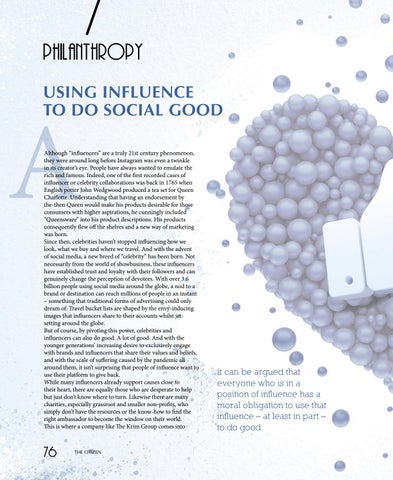philanthropy USING INFLUENCE TO DO SOCIAL GOOD
A
Although “influencers” are a truly 21st century phenomenon, they were around long before Instagram was even a twinkle in its creator’s eye. People have always wanted to emulate the rich and famous. Indeed, one of the first recorded cases of influencer or celebrity collaborations was back in 1765 when English potter John Wedgwood produced a tea set for Queen Charlotte. Understanding that having an endorsement by the-then Queen would make his products desirable for those consumers with higher aspirations, he cunningly included “Queensware” into his product descriptions. His products consequently flew off the shelves and a new way of marketing was born. Since then, celebrities haven’t stopped influencing how we look, what we buy and where we travel. And with the advent of social media, a new breed of “celebrity” has been born. Not necessarily from the world of showbusiness, these influencers have established trust and loyalty with their followers and can genuinely change the perception of devotees. With over 3.6 billion people using social media around the globe, a nod to a brand or destination can reach millions of people in an instant – something that traditional forms of advertising could only dream of. Travel bucket lists are shaped by the envy-inducing images that influencers share to their accounts whilst jetsetting around the globe. But of course, by pivoting this power, celebrities and influencers can also do good. A lot of good. And with the younger generations’ increasing desire to exclusively engage with brands and influencers that share their values and beliefs, and with the scale of suffering caused by the pandemic all around them, it isn’t surprising that people of influence want to use their platform to give back. While many influencers already support causes close to their heart, there are equally those who are desperate to help but just don’t know where to turn. Likewise there are many charities, especially grassroot and smaller non-profits, who simply don’t have the resources or the know-how to find the right ambassador to become the window on their world. This is where a company like The Krim Group comes into
76
THE CITIZEN
It can be argued that everyone who is in a position of influence has a moral obligation to use that influence – at least in part – to do good.
